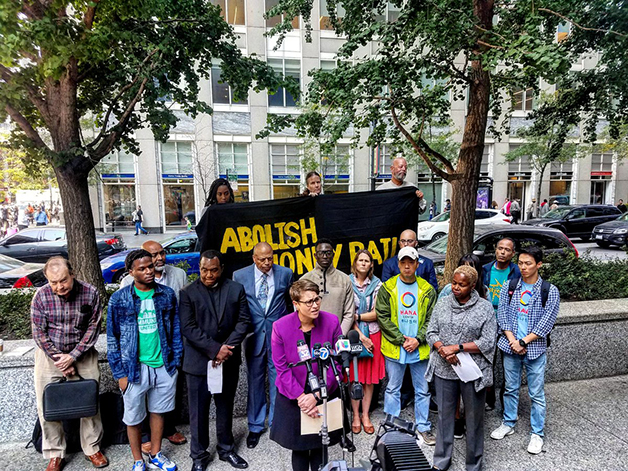Lawsuit Challenging Bond System Gets Its First Day In Court
By aaroncynic in News on Sep 12, 2017 7:22PM

Members of the Coalition to End Money Bond during a press conference ahead of the first hearing of a lawsuit challenging the constitutionality of cash bond. Photo via the Chicago Bond Fund.
Arguments were heard Monday in the first major hearing for a lawsuit challenging the Constitutionality of Cook County’s bail system.
The class action suit was filed in October 2016, in the Circuit Court of Cook County’s Chancery Division by two plaintiffs seeking to represent everyone locked up in Cook County Jail who have been found eligible for release, but are unable to post bond.
“I was supposed to be presumed innocent under the law, but just because I did not have $3,000, I was forced to spend nearly three months in Cook County Jail,” said Devoureaux Wolf of the Chicago Community Bond Fund, an organization that’s worked to raise money and post bond for dozens of incarcerated people who otherwise couldn’t afford it.
“It was a horrible experience, Cook County Jail is an environment not fit for people,” Wolf said in a statement emailed to Chicagoist. “I lost the ability to support myself and to be there for my child. More than a year after I got out, I am still recovering financially. How much money you have should never determine whether you have to sit in a cage.”
According to the Chicago Appleseed Fund for Justice, who along with the Community Bond Fund and more than a dozen other community groups formed the Coalition to End Money Bond, Cook County Jail houses some 4,000 legally innocent people—those who have been accused of but not yet given a verdict on a crime—for lacking the money to post bond.
“Bail decisions can actually change the outcomes of someone’s legal case, and that means that people should be given more than a few mere seconds to make the case about what should happen to them,” Sharlyn Gracee, a senior criminal justice Policy analyst at Chicago Appleseed Fund for Justice, said in a press conference before the hearing. “In felony cases that the County regularly takes more than a year to resolve, we’re talking about significant amounts of time that people are spending incarcerated pretrial based on very little amounts of consideration.”
Yesterday, the historic lawsuit to #EndMoneyBond had it's first major court date. Learn More: https://t.co/eOviFH8Eyb pic.twitter.com/mgL6MDHFiP
— Chicago Bond Fund (@ChiBondFund) September 12, 2017
The Chicago Tribune reports the lawsuit against five Cook County judges is on behalf of Zachary Robinson and Michael Lewis, two men who sat in jail for nearly a year because they couldn’t post the funds to be released.
"These are the poorest of the poor in our society," Matthew Piers, one of the plaintiffs' attorneys, said in court Monday, according to the Tribune. "Bail can't be unaffordable. In plain English, it's the same as if no bail had been set at all."
According to the coalition, the lawsuit seeks to declare the practices currently used by judges to set monetary bond are unlawful. Lawyers representing the judges argued changes in bail procedures and state law rendered the lawsuit moot, and that Robinson and Lewis filed their suit in the wrong court.
In July, Chief Judge Timothy Evans ordered bond-court judges to set bail amounts no higher than what a defendants "who pose no danger" can afford. Lawyers for the defendants argued that an order from the Chancery Division would be redundant of Evans’ order. Lawyers for the plaintiffs argue that they’re not asking to alter bail amounts, but that suspects ability to pay must be taken into account. The Coalition says that if the suit proceeds ultimately they’ll argue that bond setting practices violate the state and federal constitutions and the Illinois Civil Rights Act.
“Pretrial detention is fundamentally coercive,” said Grace. “As long as access to money remains a factor in whether or not someone is incarcerated or released pending trial, our criminal justice system is essentially punishing people for being poor. Furthermore, the enormous harms of our money bond system fall disproportionately on African American communities, who are the least likely to be able to pay monetary bonds.”
According to the Tribune, Judge Celia Gamrath “took the case under advisement” and plans to rule later as to whether or not the suit will go to trial.